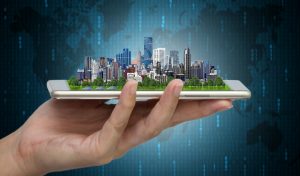
Digital transformation in constructing resilient, smart cities involves using modern technology programs to improve efficiency, productivity, and safety. It is used across all stages of a project, from design and planning to execution and maintenance. The technologies and programs commonly used include BIM, cloud platforms, IoT sensors, and AR/VR. Construction managers apply these technologies to build the finest smart cities available. ITI Technical College today for more information.
Insights Into Smart Cities
A smart city is an urban area that leverages technology and data to improve the quality of life, enhance efficiency, and promote sustainability. It achieves this by integrating various systems like transportation, energy, and infrastructure to collect and analyze data from sensors and other sources to optimize city services. Key characteristics of a smart city include:
- Connected Ecosystem: Smart cities connect various systems and services that allow seamless integration and collaboration.
- Data-Driven Decision-Making: These cities utilize data analytics to inform stakeholders about policies and improve services.
- Enhanced Citizen Engagement: Smart cities often provide citizens with online platforms for accessing information and participation in decision-making.
- Improved infrastructure: This includes smart grids, efficient public transportation, and an optimized waste management system.
- Sustainable Practices: Smart cities prioritize environmental sustainability to reduce resource consumption and emissions.
 In essence, the foundation of a smart city is built on the integration of people, technology, and processes. They connect and interact across sectors such as healthcare, transportation, education, and infrastructure to create a more efficient city.
In essence, the foundation of a smart city is built on the integration of people, technology, and processes. They connect and interact across sectors such as healthcare, transportation, education, and infrastructure to create a more efficient city.
Building Smart Cities With Digital Programs
Construction company owners and managers rely on digital transformation to build smart cities more effectively and stay competitive. Managers use Building Information Modeling (BIM) software to manage project information throughout the project lifecycle to facilitate collaboration and reduce errors. They use centralized cloud platforms to enable real-time access to project data that improves communication and timing projects among teams.
The Internet of Things (IoT) sensors track equipment, monitor site conditions, and provide real-time data for better decision-making. Managers use augmented reality (AR) and virtual reality (VR) technologies to visualize projects before construction to improve design accuracy and client communication.
Robots and automated systems can perform repetitive tasks to improve efficiency and safety on construction sites. Artificial intelligence (AI) and machine learning (ML) can analyze data to predict potential problems, optimize schedules, and improve resource allocation. Managers often use digital twins, which are virtual replicas of physical structures to allow for real-time monitoring and predictive maintenance of tools, equipment, and machinery.
| “Digital transformation in constructing resilient, smart cities involves using modern technology programs to improve efficiency, productivity, and safety.” |
Benefits of Building Smart Cities With Digital Transformation
Digital transformation is a dream come true for construction companies that build smart cities. The technology programs provide many benefits that help offset the initial cost, including:
- Data-Driven Decision Making: Access to real-time data allows for more informed and data-driven decisions.
- Enhanced Productivity: Automation and data-driven decision-making boost productivity and reduce errors.
- Enhanced Project Visibility: These technologies provide real-time visibility into project progress and status.
- Improved Collaboration: Digital tools enable seamless coloration between different teams and stakeholders.
- Improved Safety: Digital tools and real-time monitoring help identify and mitigate safety hazards.
- Increased Efficiency: Streamlined processes and improved collaboration lead to faster project completion times.
- Reduced Costs: Smart cities can optimize resource allocation and reduced errors lead to lower project costs.
City managers recognize that building smart cities offers new economic development opportunities, increased digital equity, more efficient public utilities, safer communities, and improved transportation systems.
Examples Of Smart City Applications
 By examining some examples of how smart technology applications help cities, we can appreciate why city managers want them. Smart meters and grids enable efficient energy distribution and consumption to reduce waste and costs. Smart surveillance systems and emergency response protocols enhance security and public safety.
By examining some examples of how smart technology applications help cities, we can appreciate why city managers want them. Smart meters and grids enable efficient energy distribution and consumption to reduce waste and costs. Smart surveillance systems and emergency response protocols enhance security and public safety.
Real-time data helps optimize traffic flow by reducing congestion, rerouting for street repair, and improving commute times. Smart transportation can be achieved by using electric vehicles, public transportation, and smart parking systems to promote sustainable and efficient mobility. Smart sensors and technologies can optimize waste collection routes and recycling processes.
Become A Manager In The Construction Industry
The exciting world of construction management in the digital revolution is at your fingertips. Earn an Associate of Occupational Studies (AOS) Degree in our Construction Management Program at ITI Technical College to jumpstart a career. Study about these sectors in the industry: residential, commercial, industrial, civil, electrical, and mechanical in our training. Request more information to understand what we have to offer.
For more information about graduation rates, the median debt of students who completed the program, and other important information, please visit our website: https://iticollege.edu/disclosures/




